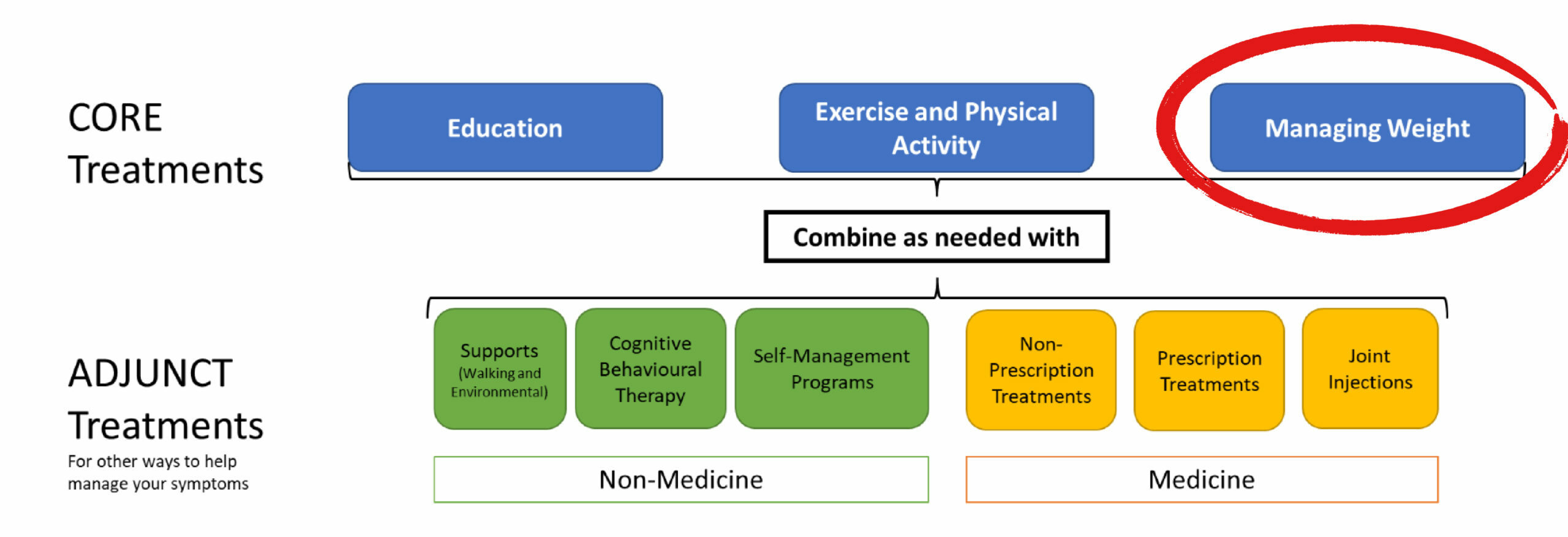CORE TREATMENT 3 – MANAGING WEIGHT
STANDARD 6
If you choose to include managing your weight as part of your care plan, you will be given options that will support your needs. Working with your clinician team will make sure your priorities, goals, values, and preferences are part of your plan to manage your weight.

OVERVIEW
- A higher body weight and extra body fat has been linked to developing osteoarthritis and to how quickly it progresses11Godziuk K, Kania-Richmond A, Hart D. Obesity: Implications for patients with osteoarthritis. for 2 reasons:
- There’s more stress on the lower limb joints with higher body weights
- There’s a relationship between the body’s internal response and how slow or quickly the OA progresses
- Staying at your weight or not gaining more weight is a Core Treatment to manage OA. It’s especially important because everyone tends to both gain weight and become less active as they get older
- For people that are obese and have OA, reducing weight can help the OA symptoms (pain and ability to do everyday things). Studies show that losing 5-10% of body weight can reduce the force and stress on joints to improve symptoms
- When you use nutrition, activity, and behavioural change strategies to lose weight, you lose about 3–5% of body weight, which still could help improve symptoms
- If managing your weight is one of your goals ask your clinician for support in making choices for your care plan
- Strategies should focus on improving your overall health, osteoarthritis symptoms, and being more active than losing weight
KEY RESOURCES
- AHS Nutritional Services – specifically Nutritional Education Materials
- Eating Well for Weight and Health Handout
- Call 8-1-1 (Health Link) and ASK to speak to a Dietician
- Your Best Health: Adult Weight Management Overview
- Adult Weight Management Programs
- Healthy Living Resources
- AB Health Living Program
- OA Self-Management Toolkit
- SAMPLE Resource Inventory
- FORM to Document/Modify a Care Plan for Conservative Management of OA
- Arthritis Society Learning Modules

Talking About Managing Weight
There are many strategies to support manging your weight when you have osteoarthritis that are based on your needs. You can work with your clinician to create a plan that meets your goals, values, and preferences. This may include7,87Kahan S. Overweight and obesity management strategies. The American Journal of Managed Care. 2016;22(7):S186-S96
8Obesity Canada. Canadian Adult Obesity Clinical Practice Guidelines (CPGs) Edmonton, Alberta: Obesity Canada; 2020 [Available from: https://obesitycanada.ca/guidelines/chapters/.:
- Using weight management services that support your lifestyle change (See Health Resources and the Treatment Menu for examples)
- Coordinating your exercise and physical activity care plans so that they work together (Standard 5)
- Asking to be referred to supports for mental health, which may help with issues like managing sleep, stress, and chronic pain
- Asking to be referred to other clinicians that can support you
- Asking to be referred to clinicians that specialize in people that are obese
Managing your weight means working with your clinician team. It can take time to create a plan that’s right for you.
For your safety, please speak with your clinician team before you make any big lifestyle changes. Your team will work with you to develop strategies to help you cope with stress and plan for life changes or events that might come up while you’re working on your goals.
Referral Between Clinicians
| Category of OA Treatments | |||||||||
|---|---|---|---|---|---|---|---|---|---|
| Discipline that may offer the treatment | Education | Exercise and Physical Activity | Weight Management | Supports (Walking and Environmental | Cognitive Behavioural Therapy | Self-Management Programs | Non-prescription Pharma Treatments | Prescription Pharma Treatments | Joint Injections |
| Family Physicians | X | X* | X | X | X* | ||||
| Nurse Practitioners | X | X | X | X* | |||||
| Physiotherapists | X | X | X | X* | X | Restricted | |||
| Occupational Therapists | X | X | X | X* | X | ||||
| Kinesiologists | X | X | X | ||||||
| Exercise Physiologists | X | X | X | ||||||
| Sport and Exercise Medicine Physicians | X | X | X | X | X | ||||
| Radiologists | X | ||||||||
| Rheumatologists | X | X | X | X | |||||
| Physiatrists | X | X | X | X | |||||
| Chiropractors | X | ||||||||
| Orthopaedic Surgeons | X | X | X | X | |||||
| Pharmacist | X | X | |||||||
| Registered Dietitians | X | X | |||||||
| Counsellors | X | X | X | ||||||
| Psychiatrists | X | X | X | ||||||
| Psychologists/Mental Health Therapists | X | X | X | ||||||
| Podiatrists | X | X | |||||||
| Pedorthists | X | ||||||||
OA Self Management Toolkit
OA Self Management Toolkit, Includes:
